Cobra KING Vintage Putter: Tested & Reviewed
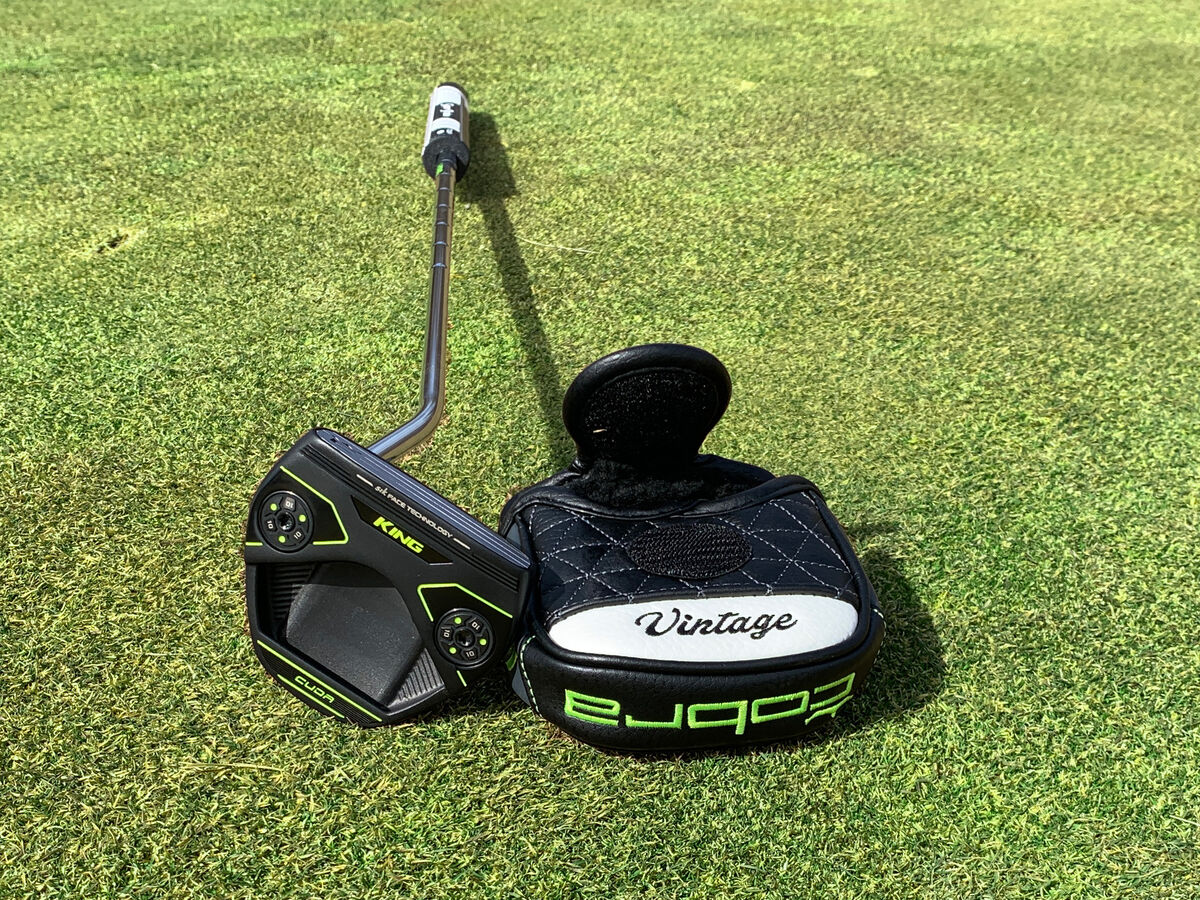
Out of the dozens of putters I've demoed in 2023, the Cobra KING Vintage line – highlighted by it’s SIK Descending Loft Technology face – grabbed my attention more than any other. After 15 minutes of tinkering on the PGA Show's practice green with the Vintage Cuda, I knew I needed to take a deeper dive. So, I put the Cobra KING Vintage through some rigorous testing on the practice green and on the course. Here’s everything you need to know.
Spoiler Alert: Cobra KING Vintage Putter Final Verdict
We’ll save the drama and just start with the conclusion. The KING Vintage Cuda putter helped me improve my performance on the greens and outperform my handicap in almost every measurable putting statistic. When I found out it comes with a $250 price tag, I was honestly surprised it’s not a $400 putter.
After using the Vintage putter for a couple of rounds, plus hundreds of putts on the practice green, I chalk up the improved performance to how easy it is to get into a consistent, proper setup; align it right where you want; and make a stable stroke. The SIK technology in the face (more on that momentarily), gives extra confidence that you can simply make a natural stroke, and the putter will ensure the roll is pure.
Let’s check out some of the specs and tech that go into these putters, then I’ll elaborate more on how it performed in my testing from pretty much every scenario.
Cobra KING Vintage Putter Specs & Tech
$249 | Cobra
SHOP PGA TOUR SUPERSTORE | SHOP AMAZON
Cobra’s KING Vintage line comes in six different heads, with a blade and oversized blade, fang, classic half-moon mallet, rounded oversize mallet (Cuda) and squared oversize mallet (Stingray).
Four of those heads offer at least two different hosel options with varying toe hang, giving you a total of 11 different builds to choose from. That’s more than enough to accommodate your eye and your stroke, whether it’s straight back and straight through, or has arc.
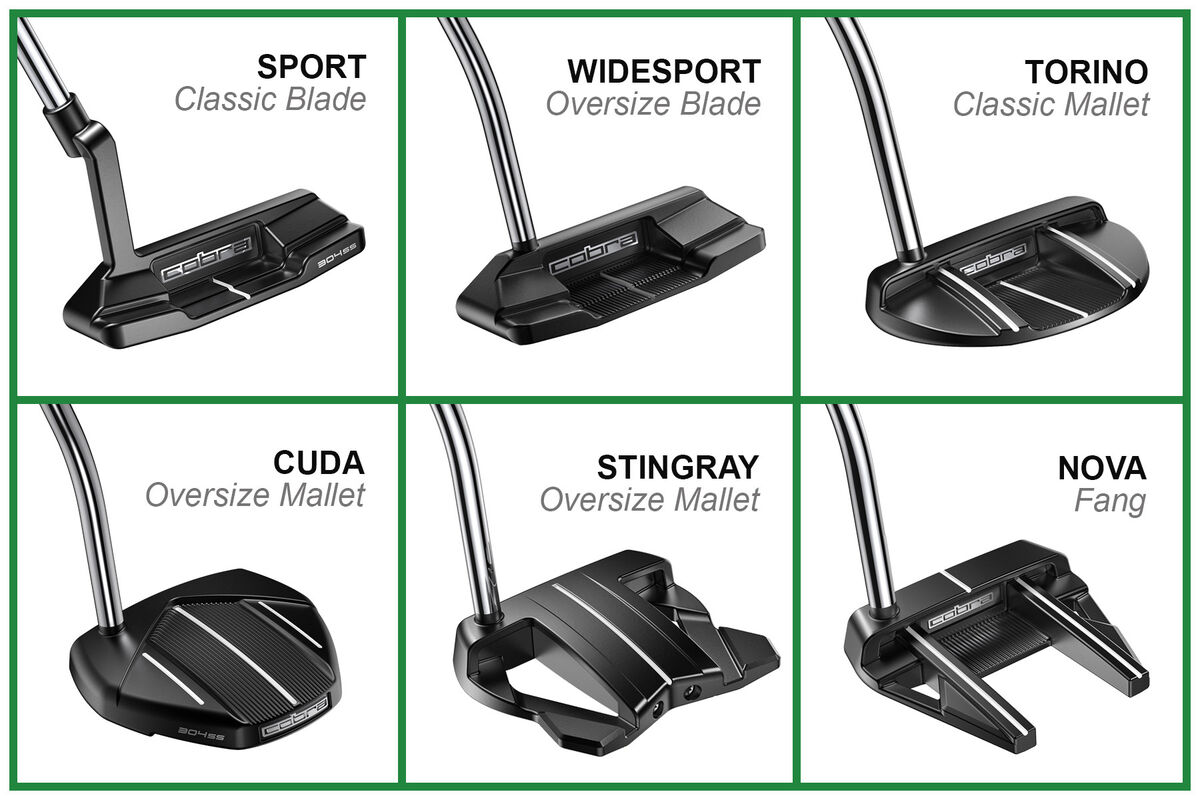
The six different head shapes of the Cobra KING Vintage lineup of putters
One thing Cobra is missing in this lineup of putters is a build designed for women. The only shaft length options in the Vintage line are 34-inches and 35-inches. An appropriate shaft length for a women's putter is 32-33 inches.
RELATED: Which Type of Putter Fits Your Stroke
Regardless of your build, the Vintage putters retail for $249. For the record, I tested the Cuda with the face-balanced, single-bend hosel.
|
Model |
Head Shape |
Hosel Options (Toe Hang) |
MSRP |
|
Nova |
Fang |
Single Bend (FB); Short Slant (40) |
$249 | SHOP |
|
Cuda |
Oversize Mallet |
Single Bend (FB); Slant (40) |
$249 | SHOP |
|
Stingray |
Oversize Mallet |
Single Bend (FB); Plumber Neck (20); Short Slant (40) |
$249 | SHOP |
|
Torino |
Classic Mallet |
Single Bend (FB) |
$249 | SHOP |
|
Sport |
Blade |
Plumber Neck (45); Flow Neck (60) |
$249 | SHOP |
|
Widesport |
Oversize Blade |
Single Bend (FB) |
$249 | SHOP |
Cobra KING Vintage Putter Features
The Vintage lineup of putters all feature SIK face technology and an adjustable weight system in the sole of the club.
SIK Face
Perhaps the most impressive feature of the KING Vintage putters is the SIK face insert that’s found in every face in the lineup, and even in Cobra’s other putter offerings.
The SIK Descending Loft Technology (DLT) putter face ranges from 1 to 4 degrees of loft. By placing less loft – just one degree – at the bottom of the club face, and incrementally increasing that loft up to four degrees at the top, SIK’s Descending Loft Technology ensures consistent, pure roll, regardless of how you strike the ball.
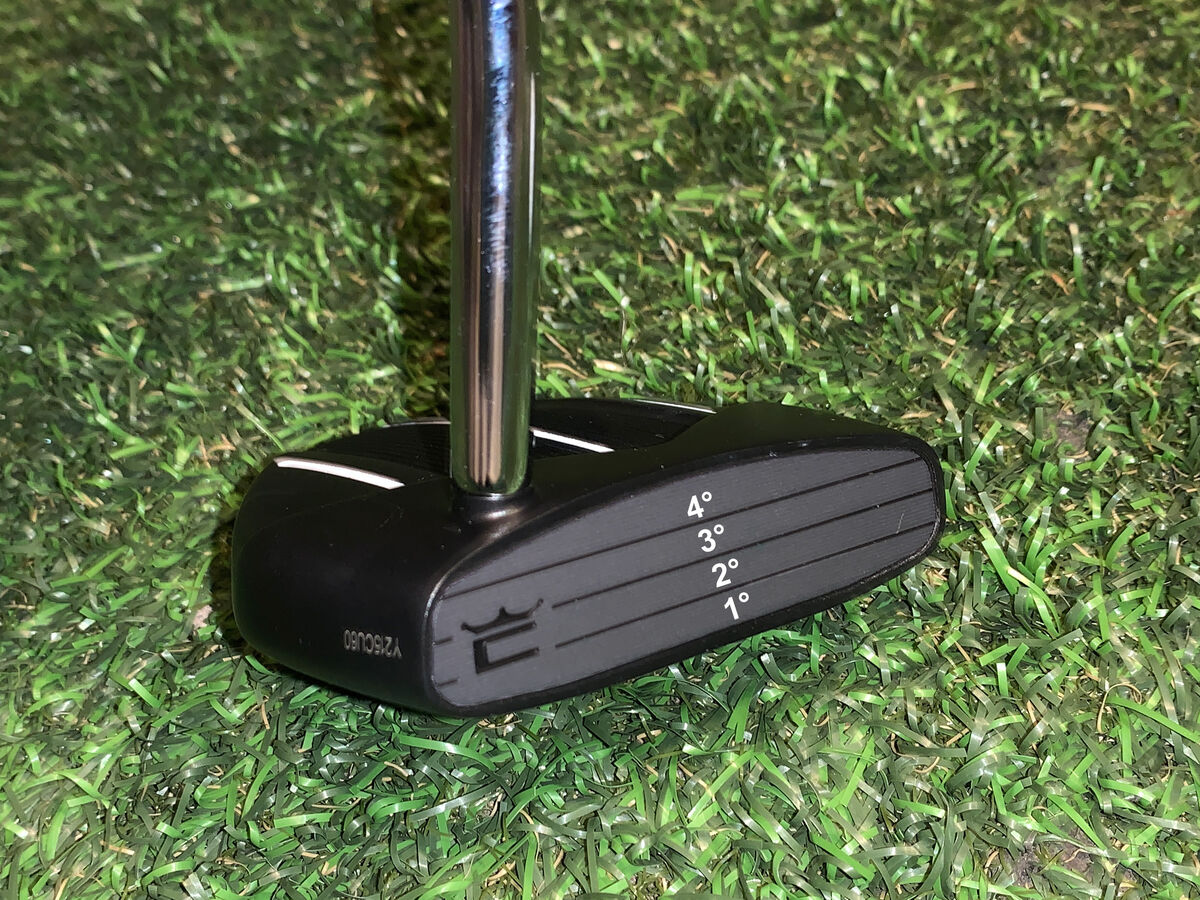
Descending Loft Technology on KING Vintage putters
Using a traditional putter with one loft across the face, a putt with an ascending blow hits the bottom of the club-face, adding loft and causing the ball to take a hop and a skip before rolling. Similarly, a descending blow de-lofts the traditional putter face, interfering with the ideal roll. In both scenarios, which can be caused by varying your shaft lean from address to impact, your distance control suffers. With SIK’s Descending Loft Technology, you get optimized roll regardless of your strike, and your distance control improves.
To test out the Descending Loft Technology, I moved the ball position all around in my stance, all the way from off my back foot to off my front foot, hitting putts off the top and bottom of the putter. I was impressed with the consistency of the roll regardless of where I struck the ball. Despite keeping a close eye on the roll, I couldn’t detect any skidding or hopping.
Not only is the DLT in the face effective, but it’s also extremely rare. SIK Golf is now part of LA Golf, and Cobra is the only company, outside of LA Golf, that has the SIK DLT face. With a base price of $2,500 for an LA Golf putter – 10 times more than the KING Vintage putter – no golfer is realistically choosing between these two putters.
Adjustable Weights
The other piece of tech Cobra offers in every KING Vintage putter is its adjustable weight system in the sole of the head. Most heads in the line come standard with two 10g weights in the sole, with the exception of the Stingray, which comes standard with one 10g weight, and the Sport, which comes with two 20g weights.
To optimize the feel and stability of your putter, you can swap out the standard weights with 10g, 15g, 20g or 25g weights.
The biggest drawback of the weight system is that the additional weights cost $25 each, so swapping them out in one of the heads with two weights costs $50.
I didn’t tinker with the weighting of the putter during testing, but with the standard pair of 10g weights in the Cuda, the putter stability was perfect for me. Some reviewers who swapped in heavier weights to help on slow greens reported being satisfied with the change.
Quality Head Cover
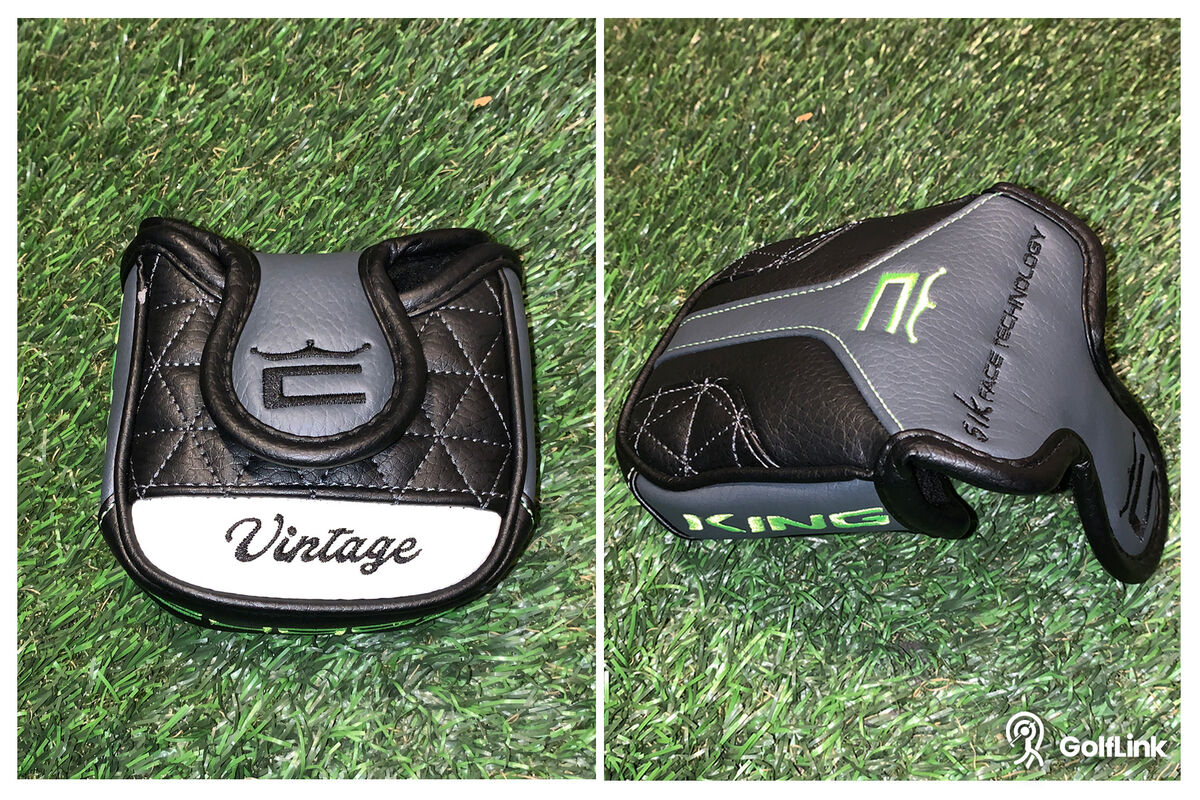
Who doesn’t love a great putter cover? KING Vintage putters come with a premium-feeling synthetic leather cover. Consistent with the putter head and grip, the cover is a classic black and white from most angles, with a splash of neon green trim when you turn it just right. Even though I could personally do without the bright green, it’s a nice blend of Vintage and modern.
Cobra KING Vintage Putter Performance & Review
Between 11 different head and hosel combinations, the SIK DLT face, adjustable weights and an attractive price tag, the KING Vintage putters are among the best putters on the market on paper. It’s time to find out how they performed on the greens.
Testing the KING Vintage Putter
To test the KING Vintage putter, I ran it through the GolfLink putter testing protocol consisting of 75 putts from 4-35 feet, from all angles, and with all breaks. I tested it from off the green, hit a handful of putts off the toe and heel, as well as high and low off the face to test forgiveness. After all that I threw it in the bag for two rounds to see how it would impact my putting performance on the course.
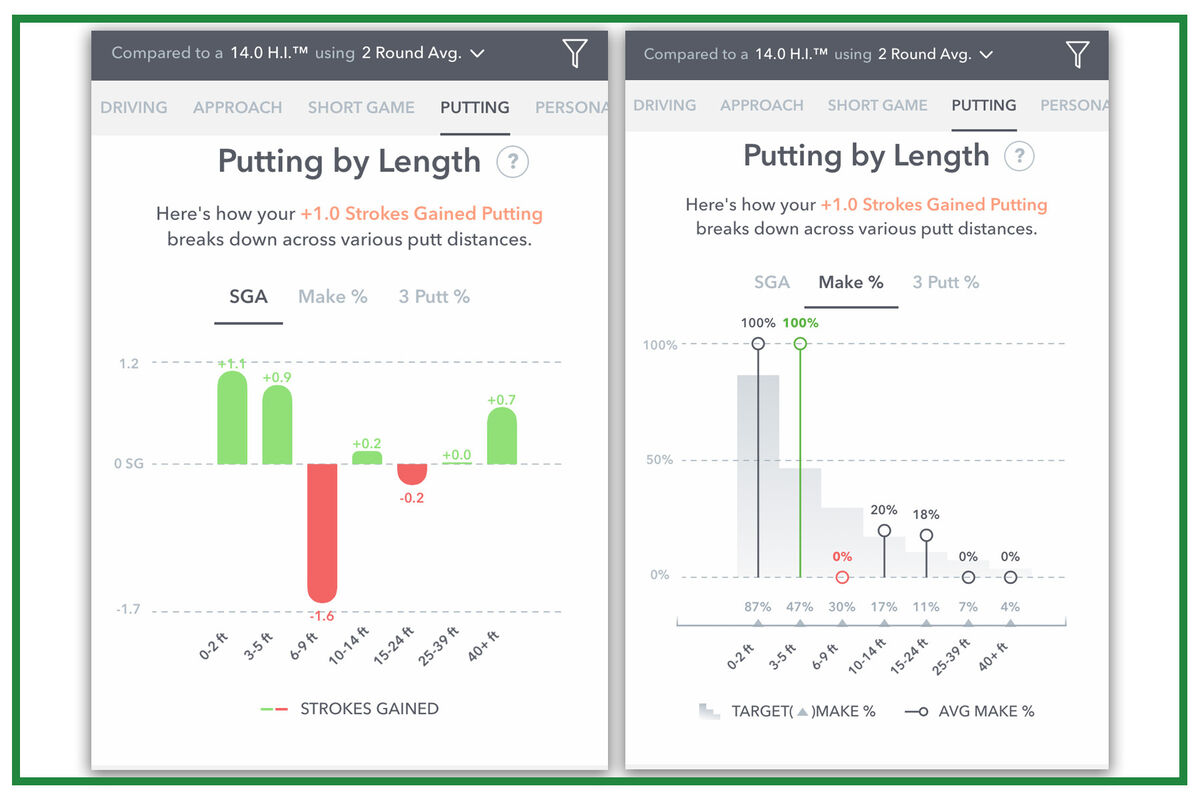
Putting statistics with KING Vintage putter from Arccos
Short and Mid-Range Putts
From four feet all the way to 25 feet, the Cuda putter I tested was super consistent. Misses were tightly bunched, and distance control felt easy on the practice green.
On the course, I made everything inside of 5 feet, including all four attempts from 3-5 feet. Compared to a 14 handicap, which is about the average among males who keep an official handicap with the USGA, I gained strokes from almost every distance, according to my Arccos dashboard.
Long Lag Putts
Lag putting on the practice green felt nice with the KING Vintage putter. The first thing I noticed was how stable the putter head was through the stroke, even on long, uphill lag putts where I had to really hit it to get it to the hole.
Through 36 holes, nothing jumped off the stat sheet from a lag putting standpoint with the KING Vintage putter. Too many 3-putts from 15-24 feet were offset by some nice 2-putts from 40+ feet, but overall, the putter felt stable on long putts.
Off the Green
As the saying goes, a bad putt is better than a bad chip, and that certainly held true in my testing. Putting from the fringe with the Cuda all but eliminated anything worse than an up-and-down from the equation.
To test the Vintage Cuda putter from off the green, I hit six putts through one yard of fringe to a pin about 30 feet away, and hit six chips from the same spot.
The best shots with both the putter and the wedge nestled within a foot or two, but the worst shots with the putter were far better than the worst chips, finishing in that 5-foot circle of friendship that became automatic for me in two rounds on the course with the Cuda.
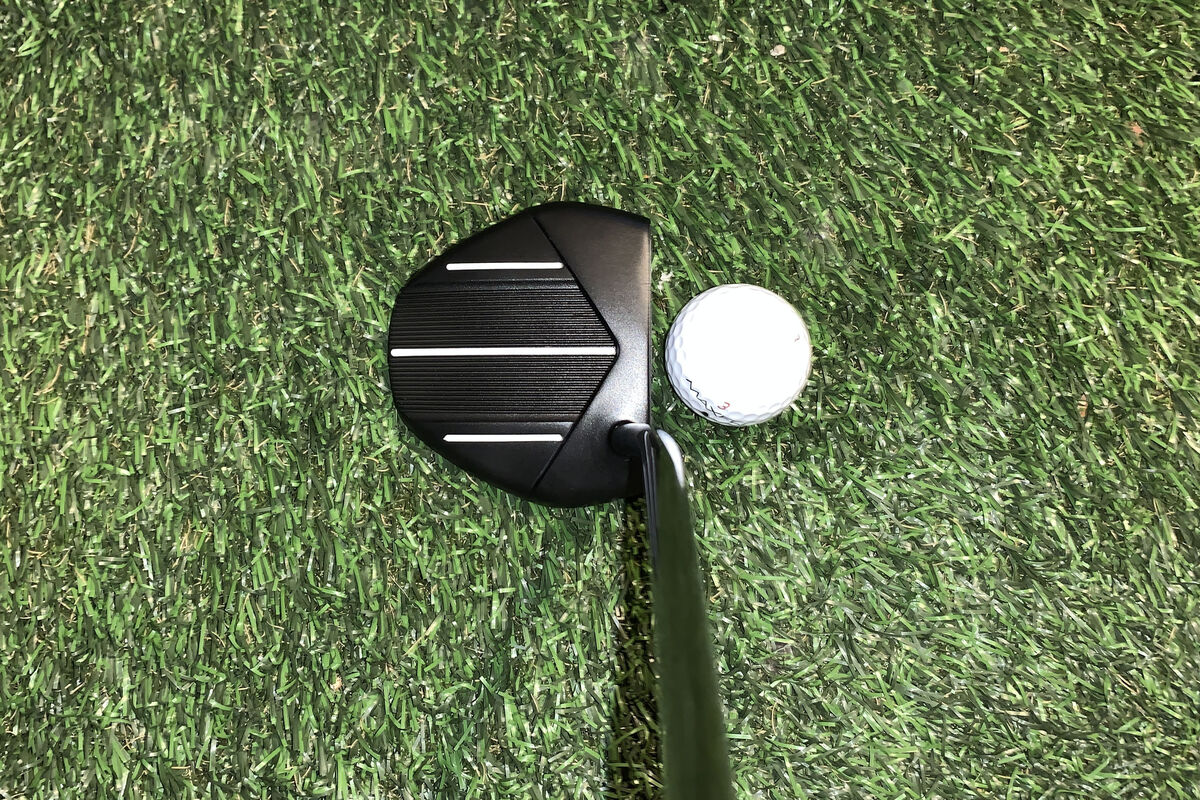
KING Vintage Cuda putter at address
Forgiveness
To test the forgiveness of the KING Vintage putter, I hit several shots off the toe and heel, and several high and low off the putter face, each from about 10 feet.
In my testing, the Cuda retained about 95% of its distance on shots hit off the toe and heel, with most putts finishing either a few inches past the hole, or just a few inches short (I putt to a spot 12-18 inches past the hole).
Equally as impressive was how well the Cuda stayed online off the toe and heel. I wasn’t punished nearly as severely as I should have been when missing the sweet spot by more than an inch.
Putts high and low off the face were essentially indistinguishable from my normal stroke. While I found the added forgiveness of the SIK DLT face to be effective, the Cuda model I tested set up so naturally that it almost seemed unnecessary. If you set the putter flush on the ground, let your arms hang naturally and grip it, it’s hard to imagine missing high or low on the putter face accidentally. Of course, the other head shapes in the lineup may not set up as intuitively to the ball, and not every golfer addresses the ball the same way every time, so it’s great to have that extra advantage.
Look, Sound, and Feel
The look of the Cuda model that I tested is confidence-inspiring at address. The few bright green accents are relegated to the sole of the club, so there’s no distraction over the ball, just the clean-looking black head with a white alignment aid.
The sound and feel off the putter face are nice, but this is the one area I felt this putter didn’t separate itself from the pack. There’s nothing bad about the sound and feel at impact, but I certainly tested putters that felt better at impact. However, seeing the ball roll pure off the face makes this feel insignificant.
Pros & Cons
To break it all down, here are my top pros and cons of the KING Vintage putters after two rounds on the course and countless putts on the practice green.
|
Pros |
Cons |
|
SIK Descending Loft Technology in the face |
Green accents won’t appeal to everyone |
|
Great value at $249 |
Interchangeable weights are too expensive at $25 per weight |
|
Naturally promotes proper setup |
With only 34 and 35-inch lengths, no women’s version |
|
Distance control is one of the best of the putters we’ve tested |
|
|
Quality head cover |
Taking Advantage of Vintage
The Cobra KING Vintage line of putters look great on paper, and after thorough testing, I can confirm the performance lives up to the billing.
Between the 11 combinations of head shape and toe-hang, almost any golfer who wants to give this putter a shot can find the build for them. Although with only two shaft lengths available, 34 and 35-inches, many women will struggle to find one they truly fit into. Besides that, I’d recommend any golfer considering upgrading their putter give these a good hard look. I think you'll have a hard time finding a putter that performs better, even if you pay close to double the cost of the KING Vintage putter.